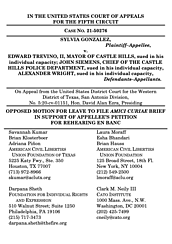Learn more about Cato’s Amicus Briefs Program.
An important constitutional question that has arisen with increasing frequency is when critics of police or other government officials may bring suit for a retaliatory arrest that was plausibly meant to punish and chill their exercise of free speech. In this case, newly elected Castle Hill, TX, city council member Sylvia Gonzalez participated in an effort to have the city manager removed from office. Following a city council meeting during which Ms. Gonalez inadvertently placed a citizen petition in her personal binder, Gonzalez was arrested and charged with violating a state law against destroying, concealing, or removing government records. Somewhat unusually—and certainly deliberately—the arrest was conducted in such a way as to ensure that Gonzalez would be unable to avoid spending time in jail even though the charges were ultimately dismissed.
Despite substantial circumstantial evidence that the arrest was made in deliberate retaliation for her efforts to remove the city manager, a divided panel of the Fifth Circuit held that Ms. Gonzalez’s civil rights claims against those responsible should be dismissed because police had probable cause to arrest her for tampering with documents and she failed to present evidence that she was arrested when otherwise similarly situated people would not have been—as purportedly required by a 2019 Supreme Court case called Nieves v. Bartlett. The dissent disagreed with the majority’s narrow reading of that decision and held that there are other ways for civil-rights plaintiffs to avail themselves of the Nieves exception to the general rule that probable cause defeats a claim for retaliatory arrest.
Joining the ACLU and the Foundation for Individual Rights in Education, Cato filed an amicus brief supporting Ms. Gonzalez’s petition for rehearing en banc before the full Fifth Circuit Court of Appeals. The brief describes how police exploit the authority and discretion they wield to chill speech with which they disagree and punish people for exercising their constitutional right to speak freely and criticize public officials. Given the importance of that speech and given how easy it is for police to conjure some reason for arresting nearly anyone, it is vitally important that people who plausibly allege that they would not have been arrested but for the government’s disagreement with their message have the ability to prove that in court and pursue plausible claims of unlawful retaliation.
View this case’s court docket, including the full opinion, here.

This work is licensed under a Creative Commons Attribution-NonCommercial-ShareAlike 4.0 International License.


